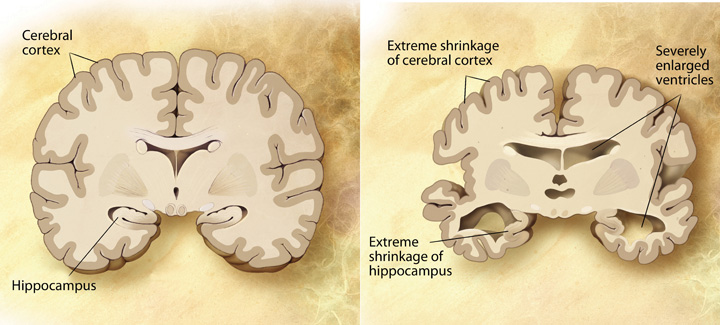With age cognitive development starts to slow down and it is important to prevent his as much as possible. Memory is a big cognitive development that starts to regress with age. This is because of brain shrinkage. The brain will automatically get rid of information that is not used, especially as a senior. There is also a major change in the way the the brain perceives information and and retains memory. Frontal cortex shrinks with age and the brain will eventually loose 5-10% of its weight. Creativity declines with age.
Normal brain vs Late adulthood brain

Frontal Lobe:
- Frontotemporal dementia can can occur with aging, usually starting as early as 70 years old. This is the degeneration of nerve cells
- This can affect frontal lobe functions such as problem solving, personality and attention
- Shrinkage in the frontal lobe
Temporal Lobe:
- Reduction in acetylcholine responsible for small amounts of memory loss
- Frontotemporal Dementia can can affect functions of the memory in the temporal lobe
- Decline in the ability to learn new names, or retrieve new information
Parietal Lobe:
- Slowing of the brain affects physical coordination
- Damage from free radicals increases, especially in the parietal lobe
Occipital Lobe:
- Change in neurons and neurotransmitters can change the way the brain communicates between neurons affecting most functions in the occipital lobe
Cerebellum:
- After age 70, most have lost the knee-jerk reflex
- By age 90, Virtually all reflexes are gone
- Motor activities are limited with age
Brainstem:
- Slowing of the central nervous system
- Can sometimes lose control of basic functions, especially with a brain disease
Disease:
Alzheimer's Disease: A disorder involving loss of mental functions resulting from brain-tissue changes; a form of senile dementia.
Cerebrovascular disease: refers to a group of conditions that affect the circulation of blood to the brain, causing limited or no blood flow to affected areas of the brain.
Parkinson's disease:a progressive disease of the nervous system marked by tremor, muscular rigidity, and slow, imprecise movement, chiefly affecting middle-aged and elderly people. It is associated with degeneration of the basal ganglia of the brain and a deficiency of the neurotransmitter dopamine.
-It is important to play mind games daily
-Sudoku, word search, simple math problems and memory games
-This will help you keep all of your cognitive abilities as best as you can
-Try to reduce stress as much as possible
- Challenge your mind
\www.websudoku.com
Physical:
As you get older, it is obvious that your physical development declines. It becomes much harder to even do daily activities. During late adulthood the skin continues to lose elasticity, reaction time slows further, muscle strength and mobility diminishes, hearing and vision decline, and the immune system weakens.
Exercise. This by itself is the most important factor. Physical activity aids cardiovascular and respiratory functions, slows the loss of muscular strength, increases bone mass, aids digestion and bowel functions, promotes sleep, and prevents depression.

Nutrition. This area encompasses a healthy diet, use of supplements, and drinking plenty of water. The experts advocate a low fat diet with a minimum of 5 servings of fruits and vegetables, and 2 to 4 servings of low-fat dairy products each day. A multivitamin is recommended to fill in gaps from the diet, as well as 6 to 8 glasses of water or clear fluids to promote optimal organ function.
Not smoking. Cessation of smoking reduces the risk of heart disease, stroke, some cancers, bronchitis, and emphysema.
Avoidance of excessive alcohol. Limiting alcohol to one glass of wine or spirits per day reduces the risk of liver disease and certain cancers. However, the older you get, the more cautious you should be, even about drinking small amounts.
How to ensure proper development:
-Exercise: walk, swim, water aerobics etc..
- Healthy eating
-Avoid smoking and heavy drinking
-Regular doctor checkups
Social Emotional:
-This time can be very exciting with grand kids, weddings, showers and reunions but it is important to have a strong "purpose to live". This could be with family, friends or activities. It is a great time to make memories and bond with family and friends

It is also important to stay social. Joining fitness clubs, social groups, bingo groups etc. This will help your social development from declining and make you busy. Keeping social connections is important
Erikson: Late adulthood- Integrity vs. Despair
In their senior years, individuals reflect on their lives and conclude that their life has or has not been well spent.
No comments:
Post a Comment